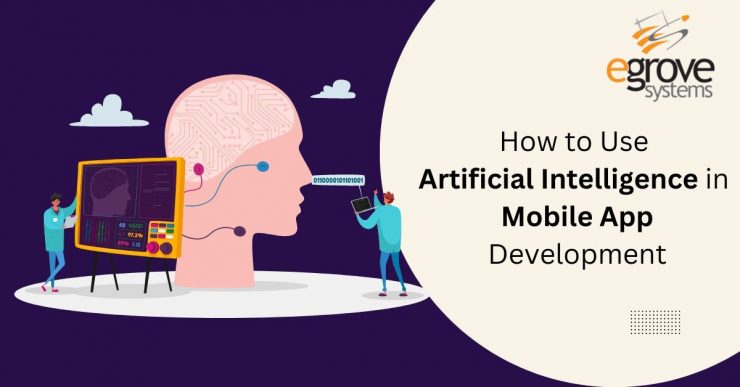Artificial intelligence is one of the most significant trends in the app development market. Through smartphone applications, AI is steadily infiltrating every normal function of ours, whether it’s education, industry, medical, or economics. Here’s how to incorporate artificial intelligence into smartphone apps.
With technological innovation, the difficulties and complexity of AI are reducing and the simplicity of operation is growing.
One such recent technology advance is artificial intelligence in smartphone apps. As their trending feature and AI is growing in popularity, the mobile app has left no subtleties to incorporate.
According to statistical data, this is the revenue of the global market for artificial intelligence forecasting.
Annual market in millions of dollars in:
2021 25995.68
2022 37987.17
2023 53231.4
2024 70971.51
2025 89847.26
The AI sector is well-positioned and will expand substantially in the next few years. Statistics demonstrate this. This is one of the primary reasons prominent mobile application development institutions are improving their talents and apps, bringing on AI developers and AI-enabled apps.
There are several reasons why AI has grown popular. It benefits both technological behemoths and local users.
Artificial intelligence has the following advantages:
1. Neural network:
Machine learning is one intriguing element of AI. Machine learning is particularly beneficial for technologies such as prediction and voice synthesis, financial markets such as automotive, aerospace, and real estate values, mortgages, credit counseling, and military reasons such as traffic signals, pictures, and autopilot recognition.
All of these functions are easily done by neural networks. Neural networks, also known as machine learning, exist now and are utilized by everyone. Here are a few of the most common applications of machine learning:
• When emails are composed, it identifies and arranges addresses automatically.
· Smart symbols and agents in computer games.
· Automatic face detection and focusing on digital cameras.
Additionally, both Google and Microsoft have added neural networks to their translation tools. They have released a new AI-powered offline language translator app for iOS and Android.
Neural network algorithms proved to be more effective, allowing users to work offline.
2. Recognize User Behavior Patterns:
Integrating machine learning and natural language processing provides realistic interactions based on user preferences. Technology can analyze user behavior and patterns based on user preferences and present exactly what the user is looking for.
Users can use this feature on her mobile app for a more customized experience.
Netflix is one of the major applications that has included this capability to track and gather data from its users. They provide content choices based on this data. Users of mobile apps prefer to acquire what they want without having to seek it.
3. Provides Conversational UI:
The conversational UI function is an excellent addition to improved communication. It allows you to engage with computers in human terms. Although speech recognition is not a novel concept, the conversational user interface makes communication more robust.
In general, management and financial applications include this technology and communicate with their users via voice or text messaging. AI technology also analyses payments, balances, and expenditures to provide consumers with the best financial suggestions.
4. Providing Automated Thinking:
Improving productivity is one of the most essential AI technologies in mobile apps. The finest illustration of this circumstance is Uber.
Uber, a taxi booking service, searches for the fastest route to the user’s current location using artificial arguments. Data is collected by automated reasoning from all taxi drivers who have driven on a comparable route and are familiar with it.
5. Finish boring jobs quickly:
Working on the same chores over and over may be tedious and irritating. However, with the assistance of AI, these repetitious chores may be completed conveniently and swiftly. Repetitive chores destroy innovation and waste time and resources.
When artificial intelligence is used for such jobs, people may produce something unique while spending more time on real-world difficulties.
6. Accuracy and perfection:
Artificial intelligence is one of the most efficient ways to boost performance while preserving accuracy and quality. AI-enabled industries are less likely to make mistakes. Low-precision computations can have severe consequences. AI can aid in the elimination of these mistakes.
Read also: Uses of Tensorflow in AI Application Development Using Python
The top 8 AI technologies deployed `in mobile apps are as follows:
1. Speech Recognition Technology:
One of the most common AI technologies used in the recognition of mobile voice systems in mobile apps. Consider Siri and Cortana, which decode and transform human voice into a format that a machine can understand.
Many mobile app development firms incorporate this feature into their apps and make it compatible with the most recent AI advancements.
2. Conversational interfaces (Chatbots):
When it comes to designing commercial apps, this Artificial Intelligence capability comes in handy. It allows businesses to communicate with visitors who fill out feedback forms or inquire about the firm.
Chatbots serve as the company’s virtual assistant, answering queries from users. Apple and Google are two well-known corporations that use virtual assistants.
3. Natural language technology:
When developing customer service apps, natural language technology is a good AI technology to integrate. Apps that create reports and market assessments need this AI technology in their mobile apps
4. Machine learning:
This is one of the most popular AI technologies built into most apps. Having an app with machine learning is very important for businesses. Machine learning techniques are very useful for classification and prediction. So if your business is about prediction, ML-based apps can be very helpful.
5. Biometric authentication
Biometrics is an AI technology that identifies, analyzes, and measures human behavior. You can recognize the physical aspects, structure, shape, and size of the human body.
Voice, gesture control, and sensory recognition are additional capabilities of biometric AI technology. Biometrics is mostly employed in marketing and research.
6. Emotion Recognition:
Another exciting AI breakthrough is the ability to interpret human emotions through facial expressions. To identify emotions, emotion recognition technology uses strong image processing or audio data. This allows capturing human emotions via voice intonation and complex linguistic signals. This technology has become quite popular among business owners.
7. Image recognition:
Image recognition is a useful tool for mobile app development. Image recognition technology is based on recognizing any element in a digital image or video. The system can also recognize license plates, analyze customers to identify people by face, and detect illness.
8. Text recognition:
Also known as natural language processing, it helps users find all the important information they need in news, search engines, and other documents. This technology is currently used in fraud detection and security systems.
How to Implement Artificial Intelligence in a Mobile App:
You must determine the AI technology or functionality you wish to include in your application. Here are some ideas for using AI in a mobile app.
· Optimize the mobile application’s search process
· Integrate audio or video recognition in the app
· Learn app users’ activity patterns
· Create an intelligent and friendly digital assistant
Conclusion:
App development has benefited from artificial intelligence. It’s not going away anytime soon. So, if you’re going to create a new app, you should give it artificial intelligence.
It is the most effective technique to attract new users and retain existing ones. It monitors user activity and provides them with a tailored experience.
















Add comment